Boondockers Welcome vs. Harvest Hosts: RV Memberships Overview
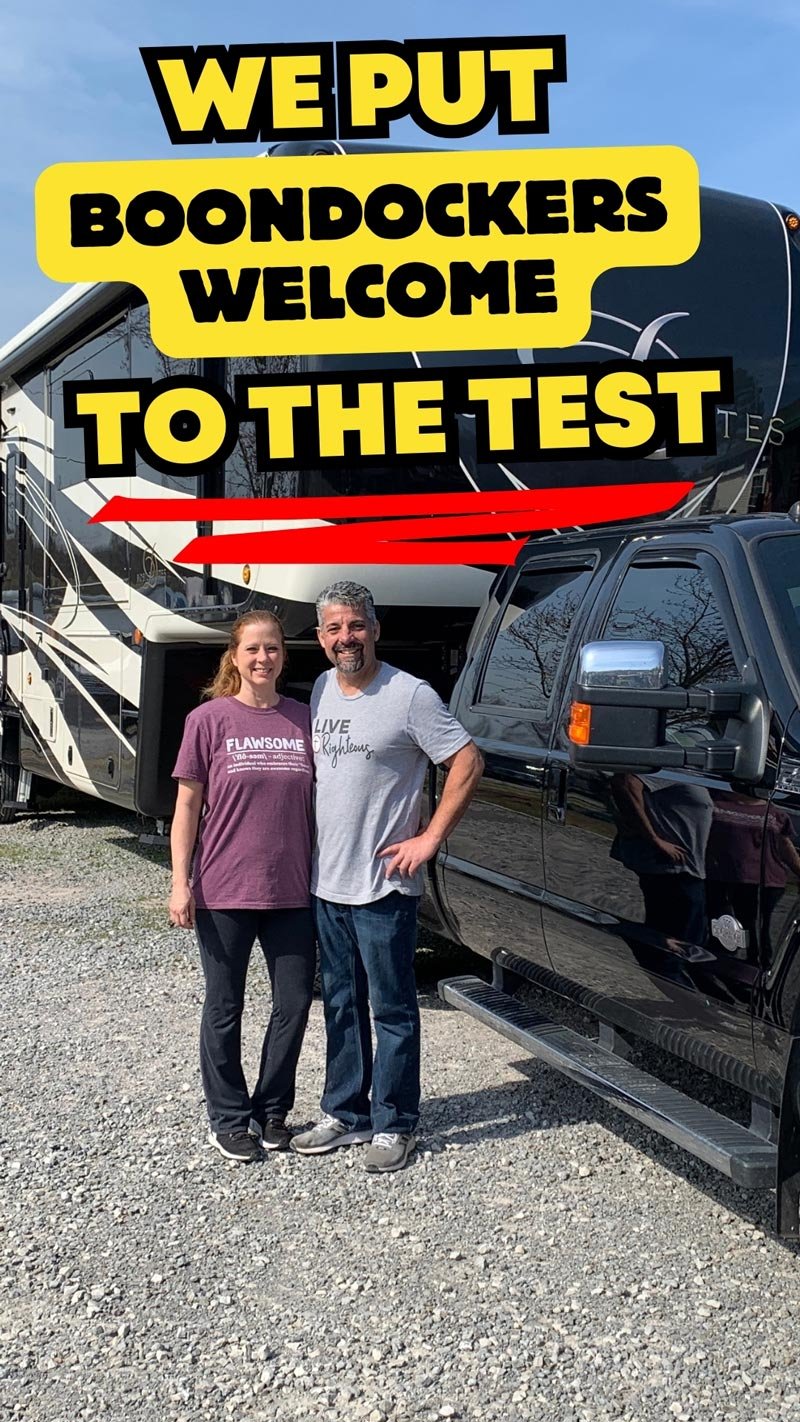
- Which one is best for you?
Boondockers Welcome vs. Harvest Hosts
Traveling in an RV offers freedom and adventure – and the right membership programs can make it even better. Boondockers Welcome and Harvest Hosts are two popular RV membership services that provide free overnight camping options outside of traditional campgrounds. Below, we’ll break down each program, what you get with an annual membership (features, benefits, tiers, pricing), and the pros and cons for both new and experienced RVers. A comparison table at the end summarizes key differences to help you decide which is right for you.
Boondockers Welcome
Program Overview
Boondockers Welcome (now part of the Harvest Hosts family) is a community-driven program connecting RV travelers with private property owners who offer free overnight parking on their land. These hosts include homeowners with extra driveway space, farms, ranches, and other private locations. The idea is simple: members get a safe place to stay at no charge (beyond the annual fee), and in exchange they thank the host and follow a common-sense courtesy code. Boondockers Welcome prides itself on a friendly, grassroots RV community and no camping fees at any host site.
Membership Features & Pricing:
- Unlimited stays: Annual membership includes unlimited overnight stays with no camping fees at any of the 3,600+ host locations across the U.S. and Canada. You can travel from coast to coast and find Boondockers Welcome hosts offering a free spot to park almost anywhere in North America.
- Annual cost: The stand-alone Boondockers Welcome membership costs $79 per year (USD), renewed annually. There are no tiers within Boondockers Welcome itself – one flat rate gives you access to all host locations. (Boondockers can also be bundled with Harvest Hosts – more on combo plans later.)
Stay duration: Hosts typically allow at least 1 night, and many permit extended stays of 2 to 5 nights for guests. This means you often can settle in for a few days, giving you time to rest or explore the local area without moving daily.
Hookups & amenities: Over 70% of Boondockers Welcome hosts offer hookups (electric and/or water) to guests. While hookups aren’t guaranteed, it’s common to have at least a 15A/30A electric outlet or a water spigot available – often offered gratis or for a minimal donation to cover the host’s cost. Sewer/dump hookups are less common, so plan to use dump stations elsewhere.
Self-contained RV required: To use Boondockers Welcome, you must have a self-contained RV (with your own toilet onboard). No tent camping is allowed, and you shouldn’t expect to use the host’s bathroom. Generators may be allowed at some locations (hosts will indicate if generators are okay and any hour restrictions). Essentially, you should arrive with your RV ready to boondock independently – hosts provide a parking spot (and maybe power/water), but not much else, which is part of the boondocking experience.
Reservation system: Stays are arranged through the Boondockers Welcome website/app. You send a stay request to the host for specific dates. Some hosts welcome advance requests weeks or even months ahead (great for trip planning), while others may accept last-minute requests if they have space. The platform handles messaging between guests and hosts and includes host profiles with details about the location (rig size limits, amenities, pet policies, etc.) and past guest reviews.
Pros of Boondockers Welcome:
Free overnight camping: There are no fees or purchases required when staying with Boondockers Welcome hosts. This is a huge budget saver – after the $79 annual fee, every stay is free. For frequent travelers or full-time RVers, the membership can pay for itself in just a couple of nights that would have otherwise cost $40+ each at campgrounds.
Community and hospitality: The program fosters a friendly RV community. You’re often staying on a private property where hosts welcome you as a guest, not just a customer. Many hosts enjoy meeting travelers – expect greetings, friendly chats, and local tips. It’s a great way to meet fellow RVers and locals. Some members say they’ve formed lasting friendships through these stays. New RVers can benefit from hosts’ advice and knowledge, while experienced RVers enjoy the camaraderie and chance to swap travel stories.
Multi-night stays: Unlike many one-night-only stopovers, Boondockers Welcome often allows multi-night stays (up to 3–5 nights) at a host’s discretion. This is ideal if you want to slow down and explore an area or need a break from driving. New RVers might appreciate the ability to stay put and get comfortable, and seasoned RVers can dig deeper into local sights. It adds flexibility – you’re not forced to drive every single day.
Extensive network of locations: With 3,600+ host sites in North America, Boondockers Welcome gives you a wide range of places to stay. Hosts are everywhere from rural farms and vineyards to suburban driveways. This large network means you can often find a free spot near your route, even in areas without traditional campgrounds. It’s especially handy for cross-country trips or touring popular regions where campgrounds may be full or expensive.
Some hookups available: Boondocking doesn’t always mean “dry camping.” A nice perk is that a majority of hosts offer at least electric or water hookups. For example, a host might let you plug into a 15A outlet in their garage or fill your fresh water tank from their garden hose. Many hosts refuse any payment for this, appreciating a friendly thank-you instead. This can be a comfort for new RVers easing into off-grid camping, and a bonus for experienced boondockers who normally wouldn’t expect hookups. It can extend your off-grid time by topping up batteries or water as needed.
Easy communication & reviews: The Boondockers Welcome platform includes a built-in messaging and review system. Guests and hosts review each other after stays, which builds trust and accountability. Before you request a stay, you can read past guests’ comments about the location and hospitality. The interface (website and app) is user-friendly for searching hosts and making requests, which reduces the stress for those new to the system.
Cons of Boondockers Welcome:
Self-sufficiency required: Because stays are truly boondocking, you must be self-contained – no bathrooms or shower facilities provided. For new RVers, this means learning to rely on your onboard systems (water tanks, toilet, generator/solar, etc.). If you’ve only ever stayed at RV parks with full hookups, there’s an adjustment to managing your resources. It’s a good idea to have a plan for where you’ll dump tanks next and to conserve water while parked. This isn’t so much a flaw of the program as it is an inherent aspect of boondocking.
Variable site conditions: Host locations can vary widely. Some are sprawling ranches or farms with ample space, while others are literally a spot in someone’s driveway or a small suburban yard. Large rigs (big motorhomes or long 5th-wheels) might find certain locations tight to maneuver or unlevel. Not every host can accommodate a 40-ft coach, for example. Experienced RVers with big rigs likely know to seek out hosts with appropriate space (the host profiles list maximum rig length allowed), but new RV owners might feel nervous backing into a snug residential driveway. It’s important to read the host’s description and reviews carefully – often they’ll mention if the approach is steep, the turn is tight, etc. – to avoid tricky situations.
Advance planning needed: Generally, you can’t just roll up unannounced to a Boondockers Welcome host. You need to request a stay through the app/website and get approved by the host. While some requests are approved instantly or on short notice, you still have to take that step. This means a bit of planning and itinerary foresight, which might not suit very spontaneous travel styles. New RVers might actually find this comforting (having a confirmed place to stay each night), but experienced nomads used to winging it at the last minute may find it restrictive at times. If you’re on a tight schedule and a host doesn’t respond, you’ll need a backup plan (like a campground or alternate host).
Limited amenities & entertainment: When staying at a private host, you generally won’t have the extras a campground might offer (no restrooms, showers, laundry, playgrounds, etc.). You are also on your own for entertainment – there’s no on-site activities beyond what the location itself is (though some hosts are on interesting properties like farms where you can interact a bit). New RV families with kids might miss having other kids or facilities around (some Boondockers Welcome stays can feel like you’re just “parking at a friend’s house”). For those who like a lively campground atmosphere or structured activities, this will feel very different. On the flip side, many appreciate the peace and quiet.
Host availability: Hosts volunteer their space and set availability in the system. There might be times when a host is unable to accept guests (traveling themselves, other commitments, seasonal closures, etc.). In less populated areas, host options could be few and those might occasionally be unavailable. Experienced RVers likely have the know-how to find alternatives (like public land camping or a Walmart parking lot if needed), whereas new RVers should keep in mind that Boondockers Welcome isn’t a guaranteed spot every single night if hosts decline a request. However, declines are not very common if you follow the host’s stated rules and request within their available dates.
Harvest Hosts
Harvest Hosts Program Overview
Harvest Hosts is a membership program that connects RVers with a network of small businesses and attractions that offer overnight RV parking. These hosts include wineries, farms, breweries, distilleries, museums, golf courses, and other unique attractions. In essence, Harvest Hosts turns your road trip into an opportunity to have memorable experiences: you might park overnight in a vineyard or on a lavender farm, or next to a country museum or a craft brewery. Like Boondockers Welcome, there are no campground fees – the stay is free – but as a courtesy, members are expected to support the host business by making a purchase (e.g., buy a bottle of wine, produce, a round of golf, or a ticket to the attraction). This creates a win-win: RVers get a safe, interesting place to stay, and the host business gets patronage and exposure.
Membership Features & Pricing:
Host network: Harvest Hosts has an expansive network of over 5,500 host locations (and growing) across North America. The majority are wineries, farms, breweries, and museums, but the network also includes golf course hosts and even a collection of campground “partner” sites that offer discounts. Hosts are in all 48 contiguous US states, most Canadian provinces, and even Alaska and Baja California – so there’s a good chance you’ll find hosts along many travel routes.
Membership plans: Harvest Hosts offers a few annual membership tiers for guests:
Classic Plan – $99/year: This is the base membership, providing unlimited one-night stays at all the farms, wineries, breweries, distilleries, and other attractions in the Harvest Hosts network (over 5,500 locations). It also includes access to the campground partners map (around 1,200 campgrounds that give discounted rates to members). The Classic plan does not include Boondockers Welcome locations or golf courses.
Harvest Hosts + Boondockers Welcome – $169/year: This combo plan (sometimes called “HH + BW” bundle) includes everything in the Classic plan plus full access to all Boondockers Welcome private hosts. In total, that gives you over 9,000 locations to choose from (the 5,500+ businesses and the 3,600+ community hosts combined). This plan is great if you want the benefits of both programs with one membership. (If you already have one program, Harvest Hosts allows upgrading to the bundle as well.)
All Access Plan – $179/year: This is the top-tier membership. It includes everything in the HH + BW bundle, plus golf courses and some extra perks. Specifically, All Access adds ~400 golf course hosts where you can stay overnight (often with the opportunity to play a round of golf). Additionally, as of 2025, the All Access plan comes with an Escapees RV Club membership (valued at $49.95) included at no extra cost. Escapees RV Club provides additional campground discounts, RV education resources, and a travel community, so it’s a nice bonus for All Access members. All Access is ideal for RVers who want the widest variety of hosts and benefits.
Stay duration: Harvest Hosts stays are generally one night per host. The expectation is that you arrive one day and leave the next. However, some hosts (especially farms or golf courses) allow extended stays at their discretion. In fact, Harvest Hosts now highlights hosts that permit “Extra Nights” (up to 2-4 nights) and some that have electric hookups for a fee. If you plan to stay more than one night, you usually arrange it with the host (and sometimes pay a small fee for the additional nights). But as a rule of thumb, plan on a single overnight stop at each location. After that, you’d move on to another host or campground.
No camping fees, but patronize host: With Harvest Hosts, you never pay for your campsite – your annual fee covers the lodging aspect. The program’s Code of Conduct asks that you support your host by purchasing something during your stay. For example, if you stay at a winery you might buy a couple of bottles of wine; at a farm you might purchase some fresh produce or local honey; at a museum you’d buy an admission ticket or souvenir. There’s no set amount required, but a common guideline is to spend around $20+ as a thank you. This isn’t a hard “rule” but strongly encouraged – it’s how hosts benefit from hosting you. Keep this in mind for trip budgeting (the cost of purchases is effectively part of the experience).
Self-contained RV required: Like Boondockers, Harvest Hosts requires you to be in a self-contained RV (with indoor cooking and restroom facilities). No tents or sleeping in cars, and generally no external generators at night unless the host says it’s okay. Some Harvest Hosts also request no outdoor grilling or campfires, since you’re essentially parking at a business (they don’t want you to create a full campground scene on their property). These rules ensure that hosts have minimal hassle and cleanup, and that you Leave No Trace.
Booking process: Members use the Harvest Hosts website or mobile app to find hosts and request stays. The platform lets you filter hosts by type (winery, farm, etc.), location, and amenities (like those with “Extra Nights” or those that allow big rigs). To stay, you either submit an online request or call the host (each profile will state the preferred way to contact). Many hosts prefer a same-day or one-day-ahead request rather than booking months out. The app now has a “Request a Stay” feature that streamlines this. New RVers might find it a bit nerve-wracking at first to call a winery and ask to stay, but hosts in the program are used to it and welcome the calls – it’s part of the routine. Just be sure to check host availability and hours (you should arrive during their open hours for check-in).
Pros of Boondockers Welcome:
Unique travel experiences: One of the biggest draws of Harvest Hosts is the chance to have truly memorable overnight experiences. Instead of a highway rest stop or crowded campground, you could be parking next to a vineyard or in the quiet pastures of a farm. In the evening, you might enjoy a wine tasting, stroll through orchards, visit an art gallery or aviation museum, play a round of golf, or feed alpacas – every host is different. These stays can turn a mundane travel day into a highlight of your trip. RVers (new and experienced alike) love the adventure and novelty – you can learn about wine-making, pet farm animals, see how cheese is made, or take a brewery tour as part of your stop. For families, it can be educational and fun for kids. For couples or solo travelers, it’s a great way to infuse local culture and flavor into your journey.
Wide and growing network: Harvest Hosts has thousands of locations and continues to expand. With 5,000+ hosts nationwide, there’s a good coverage in many regions. This means as you plan a route, you’ll likely find multiple options for a given stop. The diversity is also a plus – if you’ve done a lot of campgrounds, these hosts give you a break from the usual. Experienced RVers appreciate having more overnight options, especially when campgrounds are booked up. New RVers might find comfort in the fact that these hosts are established businesses (often easier to find/navigate than an obscure boondocking spot on public land). Harvest Hosts also actively recruits new hosts and has added categories like golf courses, which appeals to a broader audience.
Ease of use & support: The Harvest Hosts website and app make it relatively easy to locate and arrange stays. You can read descriptions, see photos, and read member reviews for each host (members often mention how flat the parking was, how friendly the owners were, etc., which is helpful). Sending a stay request through the app is straightforward. In recent updates, the app even shows which hosts allow extra nights or have certain amenities. This tech aspect can be reassuring for those new to alternative camping – you’re not going in blind. Additionally, Harvest Hosts provides customer support if you have membership issues, and a very active Facebook group/community where members share tips and host recommendations. The platform’s popularity means there’s a lot of community knowledge to tap into, which benefits new RVers.
Scenic and peaceful stays: Many Harvest Hosts are in beautiful, quiet locations – think vineyards with rolling hills, farms under starry skies, and remote museums with no one around at night. You often get a level of peace and quiet that is hard to find at roadside camp areas. RVers who have done the Walmart or truck stop overnights immediately notice the difference: instead of idling trucks and parking lot lights, you get silence, nature, and privacy. If you value a good night’s sleep on the road, these locations can be wonderful. (Of course, some hosts like breweries might be lively in the evening, but usually things quiet down later at night once business hours are over.)
Support local businesses: A big philosophical pro is that your participation directly supports small businesses. Rather than paying a campground fee to a corporation or KOA, you’re buying from a local vintner, farmer, or artisan. Many experienced RVers love knowing their travel dollars are boosting mom-and-pop operations. New RVers often enjoy discovering local products – you might find the best pie you’ve ever had at a farm bakery or a new favorite wine from a family winery. It makes spending the money feel rewarding. In essence, you’re trading a campsite fee for a unique product or experience, which often feels like a better value.
Safe, vetted locations: All Harvest Hosts are vetted and approved by the program, so there’s a level of safety and trust. You’re not boondocking on random public land or a sketchy parking lot; you’re on private property with permission. Solo travelers and those new to RVing can feel more secure sleeping at a business with an owner or staff on-site. Additionally, hosts often greet you upon arrival and show you where to park, which can ease any uncertainty about “am I in the right spot.” Knowing that 250,000+ fellow RV members use these hosts adds confidence that it’s a legitimate, well-trodden path for RVers.
Cons of Harvest Hosts:
One-night stay limitation: The flipside of Harvest Hosts’ great variety is that they are intended as overnight stops, not multi-day camping. For most hosts, you’re limited to just one night. This means if you’re on a long trip and want to spend several days in one area, Harvest Hosts alone won’t accommodate that – you’d need to mix in campground stays. Experienced RVers who are used to settling in for a few days might find the constant moving tiring if they rely on Harvest Hosts every night. New RVers might also find daily travel hectic if they string together too many one-night stops in a row. (That said, you can plan a pace that suits you, e.g., use a Harvest Host one night, then a campground for two nights, etc.)
Expected to spend money at each stop: While there are no camping fees, Harvest Hosts etiquette strongly encourages making a purchase at each host. In practice, this means your “free” night will likely cost anywhere from $15 to $50 (or more) depending on what you buy. For example, you might easily spend $30 on wine at a vineyard or $25 on dinner at a brewery. Over the course of a long trip, these expenses add up. If you were hoping Harvest Hosts would drastically cut your travel costs, be aware that it’s more of a value exchange than completely free. Some frugal RVers note that a night at a Harvest Host can cost as much as a campground once you factor in purchases – though you do get food, drink, or goods for that money. Experienced RVers often budget for this and choose hosts selectively (maybe not every single night). New RVers should be mindful not to overspend just because everything is exciting – a tip is to buy something small if on a tight budget (e.g., one bottle of wine, not a case).
Limited hookups and services: The standard Harvest Hosts stay is dry camping – no hookups. A minority of hosts offer an electrical hookup or water, and if they do, they might ask for a few dollars donation or fee for that privilege. There are no dump stations at hosts. This means you need to be prepared to camp self-sufficiently, at least for that night. In hot summer weather, running your RV air conditioning without hookups might require a generator (some hosts allow generator use outside of quiet hours). New RVers who haven’t boondocked before will need to learn power and water management. If you require electric for medical devices or A/C, you’ll have to plan carefully (maybe use a host with hookups or use your generator if allowed). Additionally, you won’t have campground amenities like showers or bathrooms (except what the business itself might offer during open hours – e.g., you could use the winery’s restroom while they’re open, but not after they close for the night). This con is similar to Boondockers Welcome, but at least Boondockers sometimes has hookups; with Harvest Hosts, assume no hookups unless stated otherwise.
Arrival and timing constraints: Harvest Hosts often require you to arrive during the host’s business hours. For example, a farm might ask that you arrive between 9 AM and 5 PM, or a winery might want you there before the tasting room closes at 6 PM. This ensures someone is there to greet you and direct you. It’s a reasonable request, but it can limit your travel schedule. If you had a long drive and were hoping to pull in late at night, that generally won’t work at a Harvest Host. Experienced RVers who are used to driving until dusk or beyond may need to adjust and stop earlier in the day. New RVers might not mind arriving early (less stress driving in the dark anyway), but it does mean carving out time for the host experience that evening. Also, because stays are one night, you’ll likely be leaving by mid-morning the next day, so it’s a short window of time at each host.
Potential for availability issues: In popular tourist regions (e.g., wine country in peak season), Harvest Hosts locations can get quite popular. Hosts usually only take a limited number of RVs per night (often just 1 or 2 rigs, some bigger places might take 3-5). It’s first-come, first-serve via request, so sometimes the host you want might already be booked for the night. This isn’t as formal as campground reservations, but essentially if a host has too many requests, they will turn some down. New RVers might not realize this and could be disappointed if they assumed a spot was guaranteed – so it’s wise to have Plan B (another host nearby or a campground). Over holidays or weekends, try to request further in advance. On the other hand, experienced RVers who travel in shoulder seasons or mid-week might rarely encounter this problem. It really depends on location and timing. Additionally, some areas (especially in the far West or very rural stretches) simply don’t have many Harvest Hosts yet (the 2018 review noted “slimmer pickings towards the west”). The network is growing, but you can’t rely on it everywhere (e.g., don’t expect hosts deep in the wilderness or in every national park area).
Not a traditional campground atmosphere: This is subjective, but worth noting – at Harvest Hosts, you won’t have the typical campground social scene or facilities. Experienced campers who enjoy meeting lots of fellow RVers might miss that at Harvest Hosts, since often you’re the only RV there (or one of just a couple). New RVers might have been looking forward to meeting others on the road; at a Harvest Host, the social interaction is more with the host or the business staff (and their customers) than with other RVers. Depending on what you enjoy, this could be a con. Some people actually count it as a pro that there’s no crowd of RVs – it’s more private. But if you love campground potlucks, you won’t find that here.
Boondockers Welcome vs. Harvest Hosts: Key Feature Comparison
For a quick side-by-side look at these two programs, here’s a comparison of key features:
| Feature | Boondockers Welcome | Harvest Hosts |
|---|---|---|
| Annual Membership Fee | $79/year (stand-alone BW membership) | $99/year (Classic Harvest Hosts) $169/year for HH+BW bundle; $179/year All Access |
| Number of Host Locations | 3,600+ private community hosts (individuals’ properties) | 5,500+ business hosts (wineries, farms, breweries, attractions) + ~400 golf courses (All Access) |
| Stay Duration | 1 night standard; many hosts allow 2–5 nights | 1 night standard (move on next day) Some hosts allow extra nights by permission |
| Cost at Location | $0 – No camping fees, no purchase required | $0 camping fee, but purchase encouraged (e.g. wine, food); budget ~$20+ per stay for host goods |
| Hookups Availability | Yes (some): ~70% of hosts offer water and/or electric (often free or small donation) | Rare: Most hosts are dry camping. A few offer electric/water for a small fee. No sewer at hosts. |
| Booking Process | Request via website/app in advance (hosts may accept requests weeks ahead). Host must approve your stay. | Request via app or call, usually 1 day ahead or same-day. Many hosts confirm quickly. Arrive during business hours. |
| Geography | USA & Canada (strong coverage in both countries) | USA, Canada, and a few in Mexico (most in USA; growing in Canada). Some regions have fewer hosts than others. |
| Type of Experience | Stay with local residents – more personal & community-oriented. Quiet, home-like settings. | Stay at attractions – tourism & entertainment-oriented. Scenic venues with things to do (tastings, tours). |
| Ideal For | Budget-conscious travelers; those who want to meet locals and don’t mind planning ahead. Great for experienced boondockers; also friendly for new RVers ready to try off-grid with some support. | RV adventurers seeking unique experiences each night. Good for road trippers who move daily and enjoy visiting attractions. New RVers get easy, safe stops (with fun included); experienced RVers use it to enrich travel between campground stays. |
(All information above is based on program details as of early 2025. Host location counts are continually growing, so check the official websites for the latest numbers.)
Which Membership Should You Choose?
Both Boondockers Welcome and Harvest Hosts can significantly enhance your RV travel, but the best choice depends on your travel style and priorities:
New RVers: If you’re just starting out, think about what kind of experience you want. Harvest Hosts can be wonderful if you’re excited to explore attractions and don’t mind moving to a new spot each day – it adds structure and fun to your journey. Boondockers Welcome might appeal if you’re looking for low-cost travels and a chance to meet helpful locals in a more relaxed setting. Some newbies start with Harvest Hosts for the easy, guided experience of staying at businesses, then add Boondockers Welcome as they become more comfortable with boondocking and want to save money on longer trips.
Experienced RVers: Seasoned travelers often see the value in both programs. Boondockers Welcome offers unmatched savings and flexibility (especially for those who already know the drill with off-grid camping), while Harvest Hosts provides a refreshing change of pace and memorable stops that break up long driving stretches. If you’ve grown tired of crowded campgrounds or sterile overnight parking, these memberships open up a world of more interesting overnight options. On the downside, veteran boondockers might find Harvest Hosts’ one-night limit a bit limiting for slow travel, and veteran campground-goers might find Boondockers Welcome hosts to be hit-or-miss in terms of location convenience. It really comes down to personal travel rhythm.
Why not both? Many RVers ultimately choose to join both programs, since Boondockers Welcome and Harvest Hosts complement each other. By having both, you literally unlock thousands of potential overnight stops. You can alternate between quiet driveway stays and lively winery nights as you wish. Recognizing this, Harvest Hosts offers a bundled pricing – about $169/year for the combined Harvest Hosts + Boondockers Welcome membership (cheaper than buying each separately) – and the All Access bundle for $179/year if you want to add golf courses and the Escapees club benefits. If you plan to RV often, the combo could easily pay for itself in savings and enjoyment.
In summary, Boondockers Welcome is fantastic for free, multi-night stays and friendly connections, making it a favorite for frugal and community-minded RVers. Harvest Hosts turns overnight stops into unique travel experiences, ideal for those who relish adventure and don’t mind spending a bit at each stop to support local businesses. Both programs have proven popular with RVers across the spectrum – from weekend campers to full-timers. By prioritizing what you want out of your travels (be it cost savings, community, convenience, or experiences), you can choose the membership that best fits your needs. And no matter which you go with, you’ll enjoy the peace of mind that comes with having a safe place to park and a warm welcome waiting at the end of the day. Happy travels and happy camping!
This post contains affiliate links, which means we may earn a small commission if you make a purchase through one—at no additional cost to you. Thank you for your support!

🚀 Let us help elevate your campground's online presence.
At RV Life Media, we specialize in enhancing the digital footprint of RV parks, campgrounds, and glamping retreats. Our comprehensive services are designed to boost your online visibility and maximize bookings:
- Custom Website Design & SEO: Tailored websites optimized for search engines to attract more visitors.
- Social Media Management: Engaging content strategies to connect with your audience across platforms.
- Targeted Ad Campaigns: Effective advertising to reach potential guests and increase reservations.
- Content Creation & Video Editing: Professional content to showcase your property’s unique offerings.
SEARCHING
LATEST POSTS
RV Pet Fence Options: Keep Your Dog Safe on the Road
RV Porch Options: A Pet-Friendly Setup with Dog Ramp
Loves RV Sites
RV Pet Fence Options: Keep Your Dog Safe on the Road
RV Porch Options: A Pet-Friendly Setup with Dog Ramp
Loves RV Sites
Exploring the Historic Poinsett Bridge
2 Responses
Leave a Reply Cancel reply
Schedule a Zoom Call With Us!
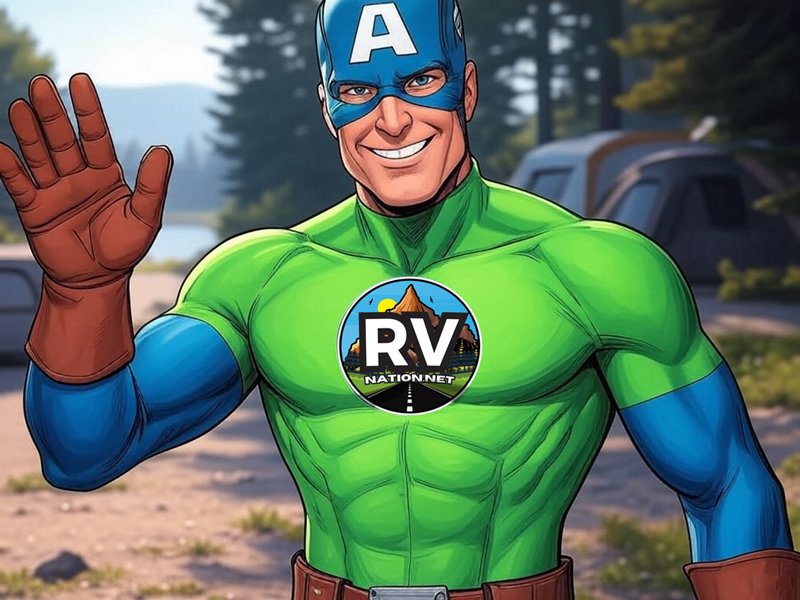
Sign up for our newsletter and get occasional emails about all things Camping, Glamping, and RV living—plus be the first to know when we publish new blog posts and articles!

WAIT, BEFORE YOU GO...
Sign up for our newsletter and get occasional emails about all things Camping, Glamping, and RV living—plus be the first to know when we publish new blog posts and articles!

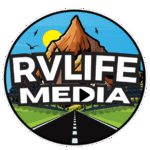


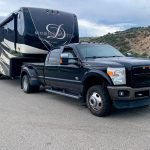
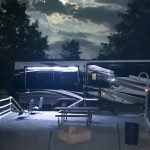
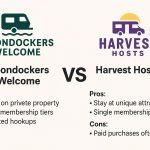

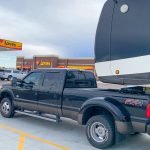
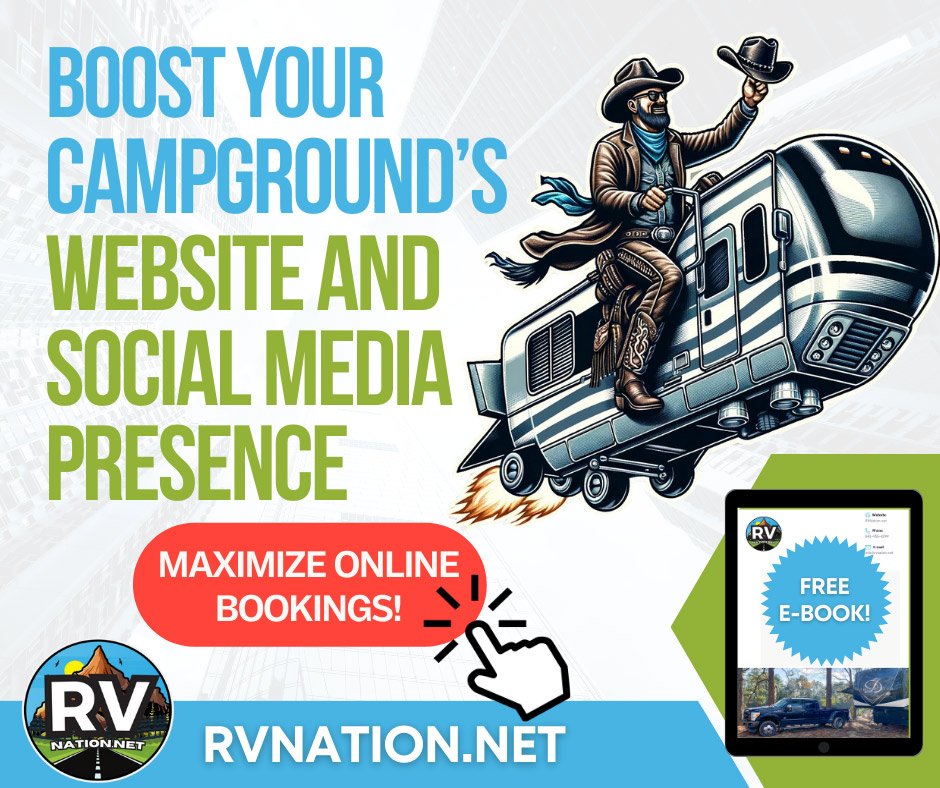


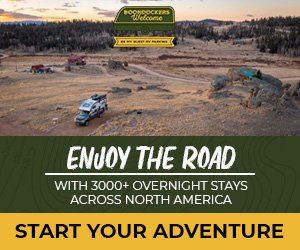

This is a masterpiece of clarity.
That’s what I’m talking about!